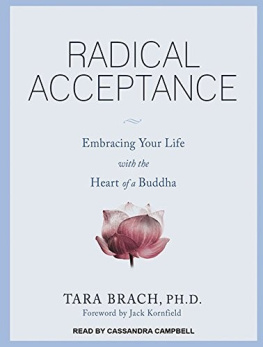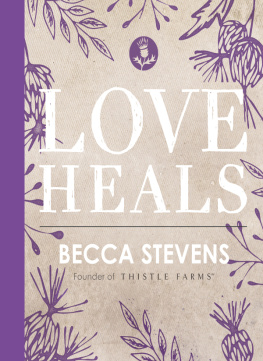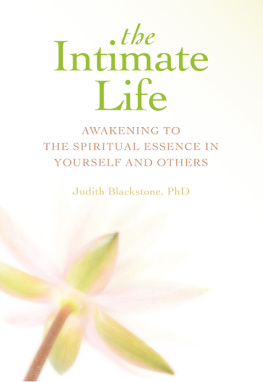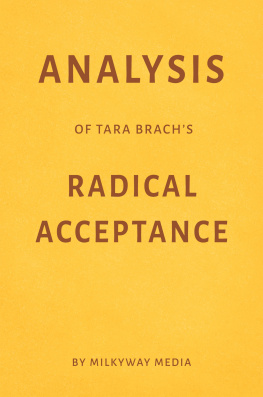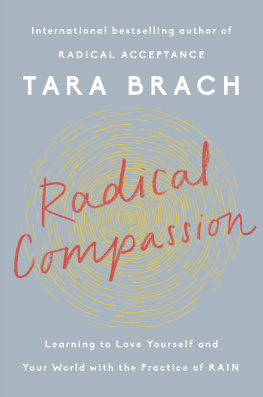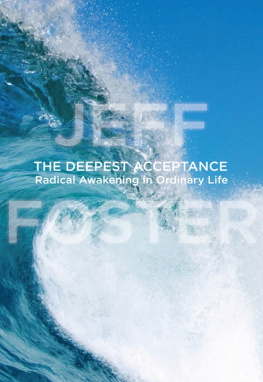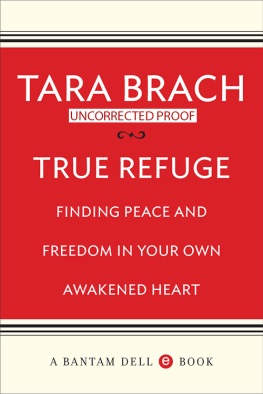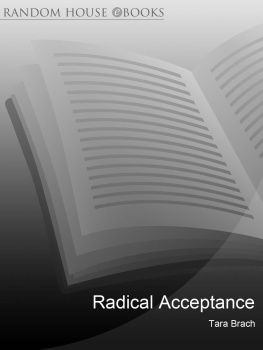Brach - Radical Acceptance: Awakening the Love that Heals Fear and Shame
Here you can read online Brach - Radical Acceptance: Awakening the Love that Heals Fear and Shame full text of the book (entire story) in english for free. Download pdf and epub, get meaning, cover and reviews about this ebook. year: 2012, publisher: Ebury Publishing, genre: Religion. Description of the work, (preface) as well as reviews are available. Best literature library LitArk.com created for fans of good reading and offers a wide selection of genres:
Romance novel
Science fiction
Adventure
Detective
Science
History
Home and family
Prose
Art
Politics
Computer
Non-fiction
Religion
Business
Children
Humor
Choose a favorite category and find really read worthwhile books. Enjoy immersion in the world of imagination, feel the emotions of the characters or learn something new for yourself, make an fascinating discovery.
Radical Acceptance: Awakening the Love that Heals Fear and Shame: summary, description and annotation
We offer to read an annotation, description, summary or preface (depends on what the author of the book "Radical Acceptance: Awakening the Love that Heals Fear and Shame" wrote himself). If you haven't found the necessary information about the book — write in the comments, we will try to find it.
Brach: author's other books
Who wrote Radical Acceptance: Awakening the Love that Heals Fear and Shame? Find out the surname, the name of the author of the book and a list of all author's works by series.
Radical Acceptance: Awakening the Love that Heals Fear and Shame — read online for free the complete book (whole text) full work
Below is the text of the book, divided by pages. System saving the place of the last page read, allows you to conveniently read the book "Radical Acceptance: Awakening the Love that Heals Fear and Shame" online for free, without having to search again every time where you left off. Put a bookmark, and you can go to the page where you finished reading at any time.
Font size:
Interval:
Bookmark:
CONTENTS

ONE
TWO
THREE
FOUR
FIVE
SIX
SEVEN
EIGHT
NINE
TEN
ELEVEN
TWELVE
OUR HEARTS ARE NATURALLY LOVING
In the West, most of us have suffered the fear of not being good enough, feeling insecure about our appearance, our sexuality, our intelligence, our spiritual progress or often most importantly being worthy of love. Whe these feelings of insufficiency or self-aversion are strong, we fear abandonment and rejection.
Radical Acceptance is the first book to explore in depth how Buddhist teachings can transform our fear and shame. Through meditation, mindfulness practices and fully understanding the healing power of compassion, we can discover the very real possibility of meeting imperfection in ourselves and others with courage and love and so transform our lives.
T ARA B RACH, P H .D., is a clinical psychologist, lecturer and workshop leader, as well as the founder and senior teacher of the Insight Meditation Community of Washington. She has been practising meditation since 1975 and leads Buddhist meditation retreats at centres throughout North America. She is also co-founder of the Washington Buddhist Peace Fellowship. Tara lives in Maryland with her son, Narayan, their standard poodle, and two cats.
For more information about Tara Brachs tapes and her teaching schedule, please contact:
Insight Meditation Community of Washington
P.O. Box 18143
Washington, D.C. 20036
or visit:
www.imcw.org
Fear and Shame Within Us

To my parents, who have graced my life
with their generous, loving hearts.
Out beyond ideas of wrongdoing and rightdoing,
there is a field. Ill meet you there.
When the soul lies down in that grass,
the world is too full to talk about.
Ideas, language, even the phrase each other
doesnt make any sense.
Rumi

You hold in your hands a beautiful invitation: to remember that it is possible to live your life with the wise and tender heart of a Buddha. In Radical Acceptance, Tara Brach graciously offers both healing words and transformative understanding, the fruits of her many years as a beloved meditation teacher and psychotherapist. Because she has immersed herself in the day-to-day work of reclaiming human dignity with heartfelt compassion and forgiveness, Taras teachings are immediate and tangible; they melt the barriers that keep us from being fully alive.
In a stressful and competitive modern society that has fostered unworthiness, self-judgment and loss of the sacred for so many, the principles of Radical Acceptance articulated here are essential for reclaiming a joyful and liberated life. Through her rich stories and accounts of students and clients, through Taras own personal journey and through the clear, systematic practices she offers, Radical Acceptance shows us wise ways to nurture ourselves, transform our sorrows and reclaim our wholeness.
Most importantly, Radical Acceptance reawakens us to our Buddha nature, the fundamental happiness and freedom that are the birthright of every human being. Read these pages slowly. Take their words and practices to heart. Let them guide you and bless your path.
Jack Kornfield
Spirit Rock Center
February 2003

When I was in college, I went off to the mountains for a weekend of hiking with an older, wiser friend of twenty-two. After we set up our tent, we sat by a stream, watching the water swirl around rocks and talking about our lives. At one point she described how she was learning to be her own best friend. A huge wave of sadness came over me, and I broke down sobbing. I was the furthest thing from my own best friend. I was continually harassed by an inner judge who was merciless, relentless, nit-picking, driving, often invisible but always on the job. I knew I would never treat a friend the way I treated myself, without mercy or kindness.
My guiding assumption was Something is fundamentally wrong with me, and I struggled to control and fix what felt like a basically flawed self. I drove myself in academics, was a fervent political activist and devoted myself to a very full social life. I avoided pain (and created more) with an addiction to food and a preoccupation with achievement. My pursuit of pleasure was sometimes wholesomein nature, with friendsbut it also included an impulsive kind of thrill-seeking through recreational drugs, sex, and other adventures. In the eyes of the world, I was highly functional. Internally, I was anxious, driven and often depressed. I didnt feel at peace with any part of my life.
Feeling not okay went hand in hand with deep loneliness. In my early teens I sometimes imagined that I was living inside a transparent orb that separated me from the people and life around me. When I felt good about myself and at ease with others, the bubble thinned until it was like an invisible wisp of gas. When I felt bad about myself, the walls got so thick it seemed others must be able to see them. Imprisoned within, I felt hollow and achingly alone. The fantasy faded somewhat as I got older, but I lived with the fear of letting someone down or being rejected myself.
With my college friend it was differentI trusted her enough to be completely open. Over the next two days of hiking on high mountain ridges, sometimes talking with her, sometimes sitting in silence, I began to realize that beneath all my mood swings, depression, loneliness and addictive behavior lurked that feeling of deep personal deficiency. I was getting my first clear glimpse into a core of suffering that I would revisit again and again in my life. While I felt exposed and raw, I intuitively knew that by facing this pain I was entering a path of healing.
As we drove down from the mountains that Sunday night, my heart was lighter but still aching. I longed to be kinder to myself. I longed to befriend my inner experience and to feel more intimacy and ease with the people in my life.
When some years later these longings drew me to the Buddhist path, I found there the teachings and practices that enabled me to directly face my feelings of unworthiness and insecurity. They gave me a way of seeing clearly what I was experiencing and showed me how to relate to my life with compassion. The teachings of the Buddha also helped undo my painful and mistaken notion that I was alone in my suffering, that it was a personal problem and somehow my fault.
Over the past twenty years, as a psychologist and Buddhist teacher, Ive worked with thousands of clients and students who have revealed how painfully burdened they feel by a sense of not being good enough. Whether our conversation takes place in the middle of a ten-day meditation retreat or during a weekly therapy session, the sufferingthe fear of being flawed and unworthyis basically the same.
Next pageFont size:
Interval:
Bookmark:
Similar books «Radical Acceptance: Awakening the Love that Heals Fear and Shame»
Look at similar books to Radical Acceptance: Awakening the Love that Heals Fear and Shame. We have selected literature similar in name and meaning in the hope of providing readers with more options to find new, interesting, not yet read works.
Discussion, reviews of the book Radical Acceptance: Awakening the Love that Heals Fear and Shame and just readers' own opinions. Leave your comments, write what you think about the work, its meaning or the main characters. Specify what exactly you liked and what you didn't like, and why you think so.

